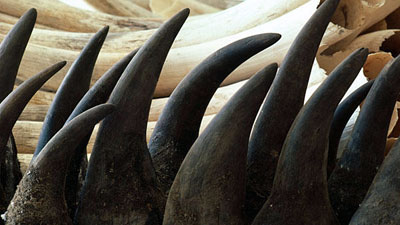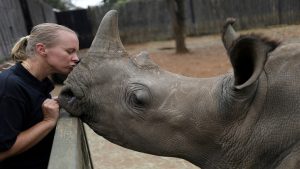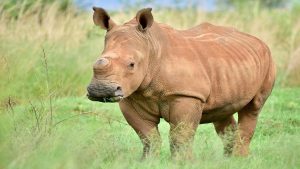The Private Rhino Owners’ Association has launched an online horn trading platform that it says will not only curb poaching figures but generate revenue to keep Rhinos safe on private reserves.
South Africa is home to the largest population of Rhinos in the world.
Under the Convention on International Trade in Endangered Species (CITES) regulations, international trade in Rhino horn is still not permitted. However, the moratorium on the domestic sale was lifted in 2017.
While private Rhino owners are backing this new trade desk, Rhino Horn Trade Africa as a viable answer to stemming the tide against Rhino poaching, conservation groups are questioning why South Africans would be purchasing Rhino horn, at all.
A Constitutional Court ruling last year lifted the ban on the domestic sale of Rhino horn despite an appeal by the Department of Environmental Affairs. This means that the precious horn can now be sold and bought within South Africa. This prompted private Rhino owners to vote unanimously in favour of an online horn trading platform to facilitate, what it’s calling and the sale of “clean rhino horn”.
Chairperson of the Private Rhino Owners’ Association, Pelham Jones says every Rhino horn offered for sale on the platform must possess a DNA certificate to guarantee it is a clean horn and that it has not been gained through poaching.
“The one has been harvested from an animal via dehorning or from natural mortality or alternatively the blood horn comes from an animal that has been killed illegally. In other words that horn comes from a crime scene. We cannot be seen to be laundering illegal or blood horns through a legal, state mechanism and that’s the reason we rely so heavily on DNA verification. If a horn is presented for trade and we check it out for its DNA we can verify the origin of that horn if its a legal or an illegal horn back to a crime scene. And immediately we would provide that information to the law enforcement officers and that horn would not be available for trade.”
The generally accepted view is that illegal Rhino poaching has been feeding demand on the international market – particularly Asian countries. However, Jones argues that there is a market domestically for Rhino horn too.
“Since the Constitutional court set aside a moratorium already some 360 kgs of horn has been traded. So that confirms to us that there is a demand for rhino horn domestically in South Africa. And obviously what is most important is that the revenue from the sale of that first 360 kgs is already going back to rhino conservation.”
Conservation groups are not convinced that the trade platform will prevent the horn from entering the international market.
In a statement the Outraged SA Citizens Against Poaching’s Kim Ribiera says “In all likelihood these legitimately bought horns will still find their way out of the country.” OSCAP says it has regularly expressed doubt about the pro-trade assertion that lifting the trade ban would stem poaching and create ‘self-sustaining funds’ for rhino conservation.
There are over 7 000 black and white Rhino under private ownership in South Africa. That is more Rhino than the rest of Africa combined.
Although private owners say they are desperately in need of funds to conserve the precious remaining few, conservation groups remain concerned that there are simply not enough law enforcement arms to control the movement of horns purchased through Rhino Horn Trade Africa.




